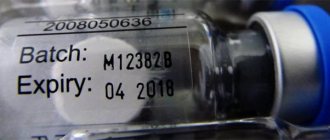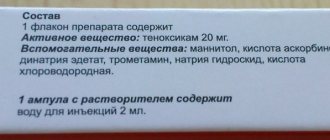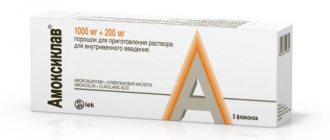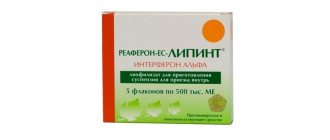Compound
Human leukocyte interferon is created from donor blood. The active components are human alpha, beta and gamma interferons.
The composition of the drug is determined by the release form. There are no preservatives, antibiotics, Australian hepatitis B antigen, antibodies to HIV and hepatitis C.
Interferon preparations are available in the form:
- lyophilized powder for preparing a solution for instillation into the nose and eyes;
- ready solution. It is placed in ampoules, the contents of which do not need to be dissolved;
- eye drops and films;
- nasal drops and spray;
- dermatological gel;
- liposomes;
- aerosol;
- oral solution;
- tablets (Entalferon);
- rectal and vaginal suppositories;
- implants;
- microenemas.
The ampoules contain a white, light pink, yellow lyophilisate or a solution with an activity of up to 1000 IU.
Interferon price, where to buy
The price of Interferon in ampoules depends on the volume of the ampoules, which pharmaceutical company produces this drug, and also on which pharmacy sells it.
The average price of interferon alfa-2b in Ukrainian pharmacies is UAH 96 per pack of 10 ampoules. You can buy injections in Russian pharmacies for an average of 100 rubles.
The price of interferon beta 1a and 1b is from 2.5 to 4.5 thousand UAH in Ukraine and from 13 to 28 thousand rubles in Russia.
Pegylated interferon in Ukraine is sold for 1.8-3.2 thousand UAH; in Russia its price ranges from 7 to 16 thousand rubles. You can find out more accurately how much the drug costs by calling a specific pharmacy.
In Russian pharmacies, nasal drops for children can be purchased from 134 rubles. The price for Interferon nasal drops in Ukraine starts from 74 UAH.
The price of Interferon suppositories for children is from 46 UAH in Ukraine and from 300 rubles in Russia.
Prices for Interferon alfa and Ribavirin , as well as prices for tablets, vary greatly.
- Online pharmacies in RussiaRussia
- Online pharmacies in UkraineUkraine
ZdravCity
- Genferon sup.
vagina/rectum, 1 million IU interferon 10 mg taurine 55 mg benzocaine, 10 pcs. JSC Biocad RUB 897 order - Genferon Light nasal spray, antiviral, interferon 50 thousand IU + taurine 1 mg/dose, 100 doses Pharmstandard-UfaVITA JSC/Biocad JSC
RUR 545 order
- Genferon Light supp. vaginal/rectal, antiviral, interferon 125 thousand IU + taurine 5 mg, 10 pcs. JSC Biocad
RUB 363 order
Pharmacy Dialogue
- Altevir (interferon alpha 2-b) (amp. 5 million IU/ml 1 ml No. 5) Pharmapark LLC/FS-Ufavita
RUB 1,683 order
- Altevir (interferon alfa 2-b) (amp. 3 million IU/ml 1 ml No. 5) Pharmapark LLC/FS-Ufavita
RUB 1,059 order
show more
pharmachologic effect
According to the anatomical, therapeutic and chemical classification, Interferon (IFN) is assigned the code L03AB, as a drug with antiviral and immunomodulatory effects. In addition, the drug has an antitumor effect.
The active substance stimulates the activity of macrophages - cells responsible for the function of cellular immunity. It increases the body's resistance to external viruses and blocks the reproduction of those that have already penetrated the cells. This is realized due to the ability of interferons to suppress the translation of pathogen messenger RNA.
Interferon is a universal antiviral drug. It is not characterized by viral specificity, its action is not directed against certain pathogens.
Alpha interferons do not affect the virus at the stages of adsorption, penetration and release - they come into play later. This component of the drug inhibits the production of viral proteins. It does not penetrate into the cell, but interacts with receptors on membranes - gangliosides and structures including oligosugars. The mechanism of this interaction is the activation of genes that encode the formation of antiviral products. Moreover, α-IFN is effective even when already infected RNA enters cells. The effect occurs a few hours after entering the body.
Beta interferons also exhibit antiviral activity, and in several ways at once. Firstly, they activate NO synthetase, which helps increase the concentration of nitric oxide in the cell. And this compound suppresses the replication of the virus. Secondly, β-IFN triggers the effector functions of natural killer cells, B lymphocytes, blood monocytes, mononuclear phagocytes and neutrophil leukocytes. All these particles are characterized by cytotoxicity - the ability to damage affected cells. Finally, the component in question blocks the release of the internal element of the virus during the process of “undressing” and prevents the natural modification of its RNA.
Gamma interferons regulate the immune response and reduce the intensity of inflammatory processes. γ-IFN has antiviral and antitumor effects. But they are relatively weak, but this component of the drug significantly enhances the activity of α- and β-interferons.
The maximum concentration of the active substance in the blood is recorded 3-12 hours after entering the nose or throat. The drug reaches the target point in full. The half-life of the drug from the body does not exceed 7 hours. Within 24 hours, it is completely eliminated from the human body.
Composition, release form and pharmacological properties
Interferon is released in the form of lyophysiate, from which a solution is subsequently prepared. The cardboard pack of the drug contains ampoules of 5 or 10 pieces with a volume of 2 ml, each of which contains 1000 IU of human leukocyte interferon. It is a white powder that disintegrates easily when shaken or pressed. The drug contains detailed instructions for use. In addition, Interferon is produced in the form of suppositories, which are used for rectal administration and in tablet form.
This remedy is obtained from human blood leukocytes, due to which the body has a pronounced immunostimulating and antiviral effect. Under the influence of Interferon, the human body's resistance to infections and viruses increases.
Indications and contraindications for use
Interferon is indicated for adults and children when:
- viral diseases of the respiratory tract;
- chronic viral hepatitis B, C and Delta;
- oncological diseases: melanoma, pancreatic endocrine and carcinoid tumors, non-Hodgkin's lymphoma, Kaposi's sarcoma (in patients with AIDS), hairy cell leukemia, multiple myeloma, blood cancer and others;
- thrombocythemia;
- eye lesions of herpesvirus and adenovirus origin;
- herpes zoster;
- multiple sclerosis;
- prevention of seasonal viral infections.
Interferon alpha preparations are mainly used to treat viral diseases. Viral hepatitis C is treated with pegylated (recombinant proteins combined with polyethylene glycol) interferons alpha-2a and alpha-2b (trademarks Pegasys, Pegitron). Conventional interferons are less effective in treating these diseases. Moreover, in the treatment of viral hepatitis C genotype 1, combination drug therapy is effective - α-IFN plus Ribavirin (a synthetic analogue of nucleosides with a pronounced antiviral effect).
But it is not always possible to use this drug. Here are the main contraindications:
- minor patients suffering from depression, other nervous and mental disorders, especially those with suicidal tendencies;
- individual intolerance to individual components of this drug and drugs of protein origin;
- renal failure, if creatinine clearance does not reach 50 ml per minute (for combination therapy with Ribavirin);
- epilepsy (if previous treatment with similar drugs did not produce an effect).
Contraindications
Interferon is not prescribed to patients with hypersensitivity to it, as well as to children and adolescents suffering from severe mental disorders and disorders of the nervous system , which are accompanied by thoughts of suicide and suicide attempts, severe and prolonged depression .
In combination with the antiviral drug Ribavirin, IFN is contraindicated in patients diagnosed with serious renal (conditions in which creatinine clearance is less than 50 ml/min).
Interferon drugs are contraindicated in epilepsy (in cases where appropriate therapy does not produce the expected clinical effect).
Instructions for use of Interferon in ampoules
Before prescribing drug therapy with interferons, it is necessary to undergo an examination to assess the susceptibility of the microflora that caused the disease to the active substance.
How to use the drug for treatment
The drug is not intended for injection. It is used for intranasal administration and inhalation.
The optimal method of use, hourly intervals and dosage are determined by the doctor, based on the anamnesis, clinical picture, and research results. In some cases, the course of treatment can be up to 14 days.
For treatment, instillation and spraying into the nose and inhalation are recommended. The composition for performing these procedures is prepared as follows. The ampoule with the drug is opened, the powder contained in it is diluted with 2 ml of distilled or boiled water (up to the mark on the vessel), shaken until completely dissolved. The resulting solution can be stored for 24 hours at a temperature not exceeding 15 degrees.
The prepared solution is instilled into the nose at intervals of 1-2 hours at least 5 times a day, 5-6 drops in each nostril. This is done with a pipette or syringe without a needle. Spraying is carried out at the same frequency of 0.25 ml per application using the nozzle or sprayer included in the package.
Prophylactic doses of the drug
For the purpose of prevention, prepare a solution according to the scheme described in the previous paragraph. It is instilled into the nose, 5 drops in each nostril every 12 hours. The interval cannot be less than 6 hours. At the same frequency, intranasal spraying is performed at a dosage of 0.25 ml.
Overdose of hours
During clinical trials, no cases of overdose were recorded.
Interferon for children
According to the instructions, interferon preparations are indicated for children:
- for infectious and inflammatory diseases of the respiratory system ;
- with meningitis ;
- for sepsis ;
- for the treatment of childhood viral infections (for example, mumps or chickenpox );
- for the treatment of chronic viral hepatitis .
IFN is also used in therapy, the purpose of which is the rehabilitation of children who often suffer from respiratory infections .
The most optimal option for children is nasal drops: when used in this way, interferon does not penetrate the gastrointestinal tract (before diluting the drug for the nose, the water should be heated to a temperature of 37°C).
For infants, the instructions recommend the use of interferon for various types of infectious diseases , including diseases of the respiratory system and intrauterine infections .
For infants, interferon is prescribed in the form of suppositories (150 thousand IU). Suppositories for children should be administered one at a time 2 times a day, maintaining 12-hour intervals between administrations. The course of treatment is 5 days. To completely cure ARVI , as a rule, one course is enough.
For preventive purposes, ointment is recommended. It is necessary to lubricate the child’s nose twice a day every 12 hours.
For treatment, you should take 0.5 g of ointment twice a day. Treatment lasts on average 2 weeks. Over the next 2-4 weeks, the ointment is used 3 times a week.
Numerous positive reviews of the drug indicate that in this dosage form it has also established itself as an effective remedy for the treatment of stomatitis and inflamed tonsils . Interferon inhalations for children are no less effective.
The effect of using the drug increases significantly if a nebulizer is used to administer it (it is necessary to use a device that sprays particles with a diameter of more than 5 microns). Inhalations through a nebulizer have their own specifics.
First, interferon must be inhaled through the nose. Secondly, before using the device, you must turn off the heating function (IFN is a protein; at temperatures above 37°C it is destroyed).
For inhalation in a nebulizer, the contents of one ampoule are diluted in 2-3 ml of distilled or mineral water (saline solution can also be used for these purposes). The resulting volume is enough for one procedure. The frequency of procedures during the day is from 2 to 4.
It is important to remember that long-term treatment of children with interferon is not recommended, since addiction develops to it and, therefore, the expected effect does not develop.
Side effects
Unfortunately, Interferon often causes side effects. The use of the drug most often provokes:
- anorexia;
- chills;
- shiver;
- nausea, less often – vomiting.
Such manifestations are rarely recorded;
- lethargy, drowsiness, other asthenic symptoms;
- loss of concentration, confusion;
- irritability;
- insomnia or difficulty falling asleep;
- depressed state, depression, suicidal thoughts;
- general malaise, “flu-like” condition;
- dry mucous membranes in the mouth;
- hair loss;
- pain in the back, muscles;
- temporary disruption of taste buds;
- decrease in blood pressure.
In isolated cases the following are recorded:
- epigastric pain, problems with stool, other dyspeptic symptoms;
- weight loss;
- increased appetite;
- increased concentration of uric acid in the blood, impaired renal function, renal failure;
- elevated temperature;
- breathing problems, feeling of lack of air, infiltration processes in the lungs;
- cramps in the arms and legs;
- tachycardia, peripheral vascular ischemia;
- skin rash;
- dry skin;
- bleeding gums;
- itching and cutting sensations in the eyes, decreased clarity of vision;
- decrease and loss of hearing;
- increased or decreased salivation;
- secondary viral infection;
- endocrine disorders - hyper- and hypothyroidism;
- neuropathy;
- anxiety, unstable mood;
- psychotic symptoms – hallucinations, aggressiveness.
In women, disruption of the menstrual cycle and reproductive function is possible due to a decrease in the levels of estrogen and progesterone in the blood. Women and men taking interferon drugs are advised to refrain from conceiving.
Special instructions and precautions
Interferon is not always safe. It is required to take it with caution in some cases. The risk group traditionally includes women during pregnancy and lactation, children and the elderly. Their immunity is weakened and cannot effectively fight diseases.
In patients with polymorphism in the interleukin 28 beta gene of the cytokine receptor class, which is responsible for encoding interferon λ-3, the effectiveness of treatment may be reduced. At the same time, in patients with normal alleles of this gene, a pronounced stable result is achieved.
Drug interactions
Interferon is often used with other drugs to make treatment more effective. Good results are achieved when combined with glucocorticosteroid and adrenocorticotropic hormones.
The simultaneous use of Interferon with myelosuppressive medications, including cytostatics, is not recommended. Co-administration is characterized by additivity, when the total effect is better than the results of monotherapy, but worse than if the drugs were taken separately.
Combined use with Telbivudine is prohibited, as this mutually enhances the effect on HIV infection.
Take Interferon with caution with substances whose clearance depends on the cytochrome P450 system. These are antidepressants and medications that relieve epilepsy.
Combination therapy with Phosphazide increases the myelotoxicity of both drugs. During treatment, it is necessary to monitor the level of hemoglobin and granulocytes.
Use during pregnancy and lactation
Pregnancy and breastfeeding are relative contraindications for the use of Interferon. The active ingredients easily penetrate into mother's milk and pass through the placental barrier. Therefore, the physician must consider the potential risks and possible benefits when choosing this drug.
During treatment with interferon drugs, it is recommended to take a break from breastfeeding. To mitigate side effects, paracetamol is prescribed at the same time.
Prescription in childhood
Children are not given injections. They are prescribed treatment with interferon drugs in the form of suppositories, drops and ointments. Children under three years of age are allowed instillation into the nose and irrigation of the mucous membrane, and later - inhalation.
The medicine is used for therapeutic and prophylactic purposes. To prevent viral infections, a solution is prepared - the contents of the ampoule are diluted with distilled or boiled water. It is dropped into the nose or inhaled. This method of preventing infection is also recommended for adults.
Interferon during pregnancy
Interferon is not recommended for use during pregnancy and while breastfeeding .
An exception may be cases when the expected benefit of therapy for the expectant mother exceeds the risk of adverse reactions and harmful effects on the development of the fetus.
The possibility of isolating recombinant IFN components in breast milk cannot be ruled out. Due to the possibility of exposure to the fetus through milk, IFN is not prescribed to nursing women.
As a last resort, when the administration of IFN cannot be avoided, the woman is advised not to breastfeed during therapy. To mitigate the side effects of the drug (the occurrence of symptoms similar to those of influenza), simultaneous administration of paracetamol .
Analogs
Interferon has several analogues:
- Roferon A;
- Genfaxon;
- Inferon;
- Lipoferon;
- Laifferon;
- Intron A;
- Betaferon;
- Grippferon;
- Alfarekin;
- Ingaron;
- Pegasis;
- Interlock;
- Pegintron.
These medicines are also based on human blood and have a similar healing effect. Therefore, if there is individual intolerance to individual components of Interferon, you can try other drugs. But it is better to trust the doctor to prescribe melting treatment.
Interferon is a universal drug that can be used alone or in combination with other medications. He has high efficiency rates. It is safe if you follow the instructions and do not exceed the recommended dosage. Although there are few contraindications, side effects occur quite often. If problems arise, it is important to immediately consult a doctor and stop taking the medication. Long-term treatment can negatively affect the patient's health.
Reviews
Parents' opinion
Moms and dads like that the drug is inexpensive and in liquid form it is immediately ready for use. Its advantages also include a small number of contraindications and adverse reactions. Most of these reviews look bought.
Parents leave negative reviews saying that the medication did not help.
Opinion Komarovsky
Evgeniy Olegovich believes that Interferon is a medicine with unproven effectiveness.
The drug is available by prescription, so self-medication is prohibited. Only a doctor should decide how to administer Interferon to a child.
By








